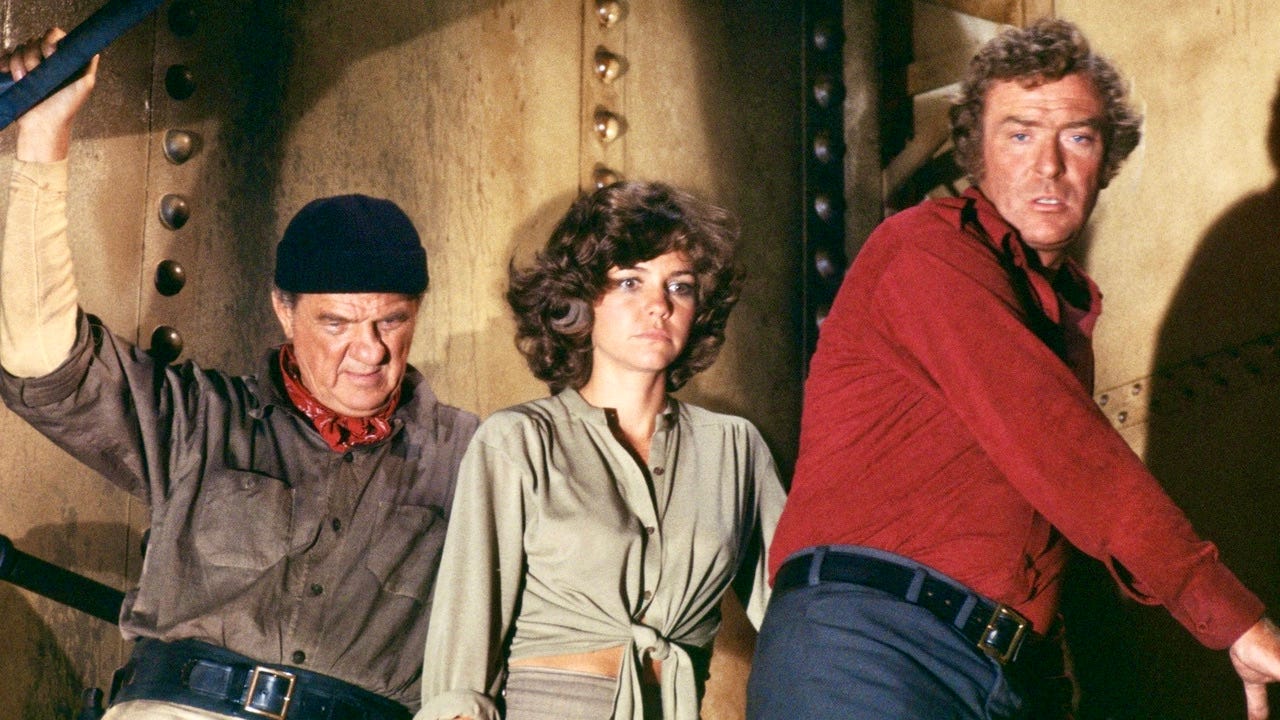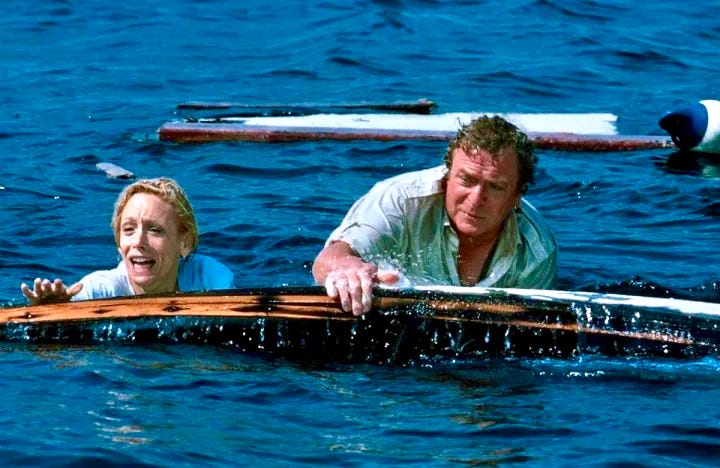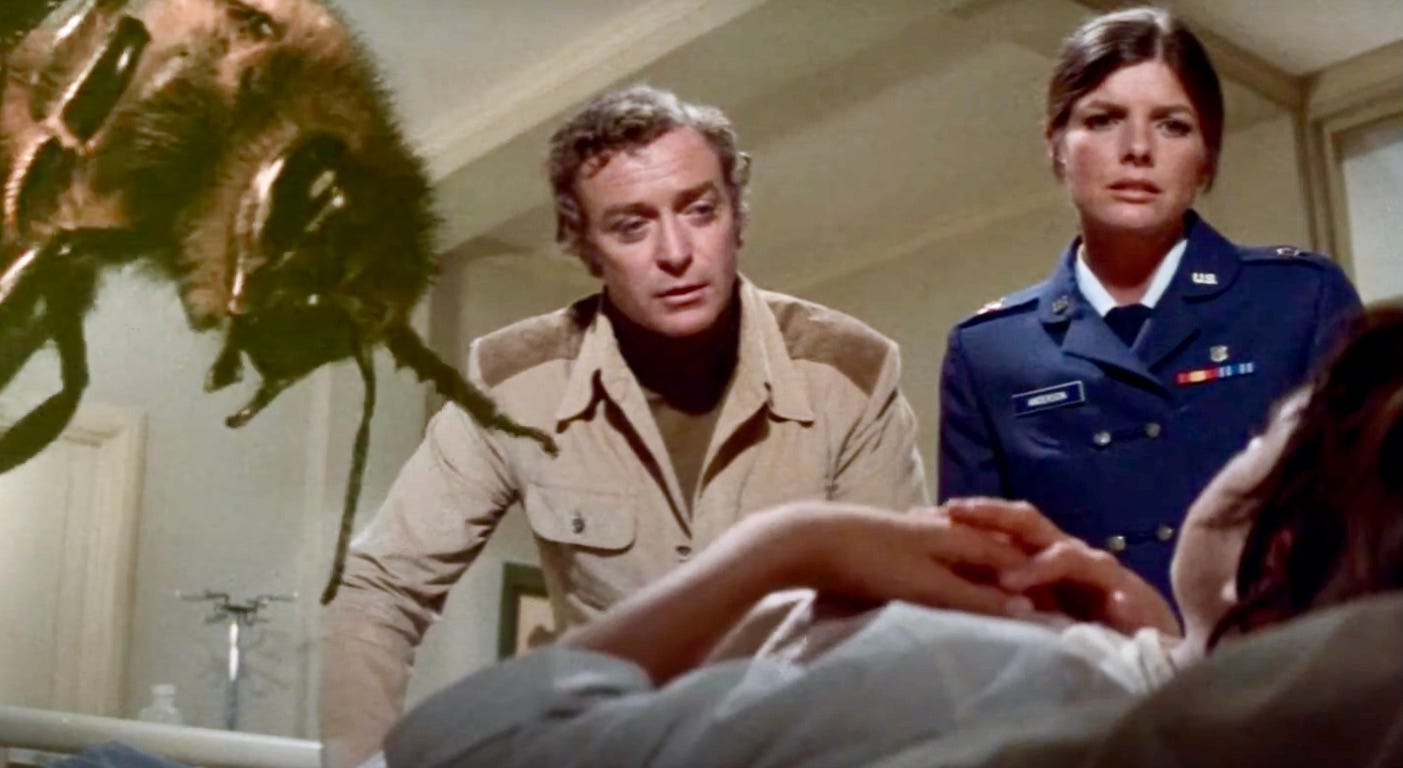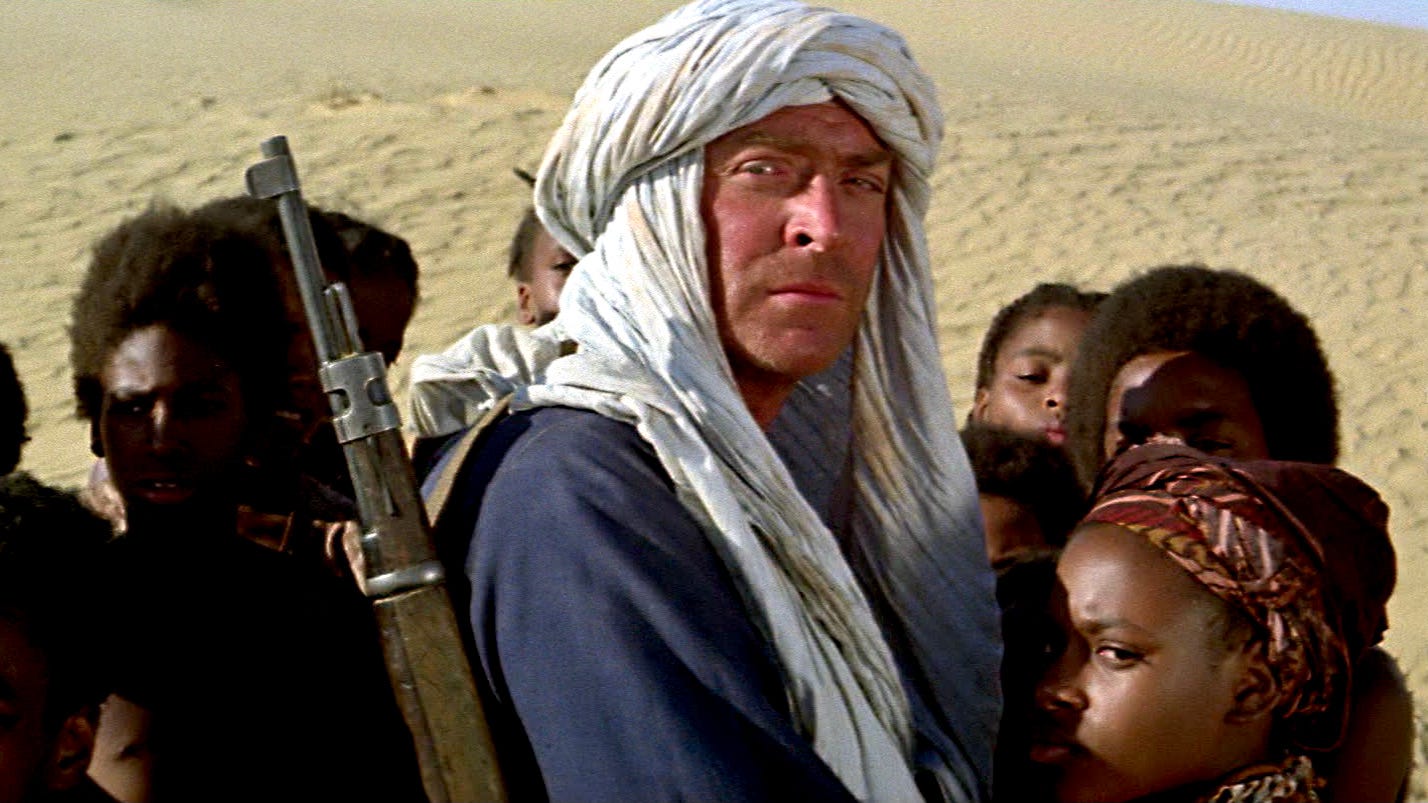Michael Caine's Hall of Shame
Celebrating the dubious artistic paths of a bona fide national treasure.
A daring, hard-working and well-respected actor, Michael Caine was also once, rather more notoriously known as the best friend a bad movie ever had. He was the one who’d do anything for money yet got away with it because he made no secret of his avarice. He was the jobbing actor whose legacy includes a small but spirited collection of films so spectacularly bad that even though they represent less than 10% of his entire output, he is worshipped by bad movie buffs worldwide as the Patron Saint of Celluloid Stinkers. He is the star of The Swarm, Ashanti, Beyond the Poseidon Adventure, The Island, Jaws the Revenge and On Deadly Ground, and it is on this fertile soil that I have grown this affectionate tribute.
“People often criticise me for not being discriminating enough,” explained Caine in his candid if not terribly gossipy 1992 biography ‘What’s It All About?’ “First of all I choose the great roles, and if none of these come, I choose the mediocre ones, and if they don't come, I choose the ones that pay the rent. This,” he admits, “has often led me down dubious artistic paths…”
The year was 1978. Caine was living in England at the time and forking out most of his earnings to the taxman. Thoughts of moving to the States grew increasingly attractive. Fate stepped in and the phone rang. It was legendary producer Irwin Allen, the master of disaster behind such monster hits as The Towering Inferno and The Poseidon Adventure. Advising Caine to move to Hollywood for the sake of his career, Allen offered him a job with a big enough salary - $250,000 after tax – to put a down payment on a house in Beverly Hills, “where,” Caine reflects, “prices were like telephone numbers with noughts added”.
“The movie was doomed but we didn’t notice,” said Caine of The Swarm, the witless killer bee shocker that initiated his historic losing streak. The film, which marked Allen’s ill-advised directorial debut, “was one of the worst I ever made, but it got me to America,” added Caine, characteristically looking on the bright side, “and opened up all sorts of opportunities for me.”
As it happens, Caine had a pretty good time making The Swarm, his first crack at a special effects blockbuster. The work could be dull and the bees could be a pain, but the company was great. Not content with a single star, Irwin Allen had gathered a galaxy of Hollywood greats, steeped in Oscar glory, all irresistibly drawn towards his magnificent chequebook. Caine shared the screen, and more importantly the blame, with the likes of Henry Fonda, Fred MacMurray and Olivia DeHavilland.
He also got to warn the world of a fast approaching menace. “This is more than a movie,” screamed the posters, “it's a prediction!”
“The Brazilian or African Bee comes out and looks for you and attacks you for no reason,” screamed Caine at any passing journalist. “Four stings will kill a fully grown man!”
Thanks to Caine we were ready when the killer bees launched their assault on humanity.
For the record, Caine played po-faced science guy Brad Crane, obsessed with bees, ordered by the President to annihilate a colossal swarm of African Killers buzzing around the States. During production, an estimated million bees – not killers, but not exactly friendly either – had their stings removed, by hand, by four brave pluckers. Despite Allen’s claims that he wanted everyone on the set to be “2000% safe!” several bees escaped with stingers intact and whenever a scream was heard, cries of “hot one!” surely followed. There are, however, worse things than being stung by a bee.
Picture a small enclosed set full of movie stars in protective gear. Add legions of bees, newly released into the room and, as they tend not to relieve themselves in their special bee homes, “busting for a crap”.
Caine elaborates. “We noticed our dazzling white smocks gradually turning a shade of pale brown as the stingless bees took their final revenge. Unfortunately, when the picture eventually came out, the critics did exactly the same thing…”
With a budget of $12 million, and an additional $6 million spent on advertising, The Swarm was, at the time, the biggest release in the history of Warner Bros. “One of the most terrifying movies ever made,” said Allen of his work. The New York Times disagreed, setting the tone for the critical onslaught to follow, declaring it “the comedy hit of the season”.
Caine’s rise to the rank of Turkey Master had begun, and his ascent was gathering pace. A brief stint as one of the many stars of Neil Simon’s California Suite bought him some time with the critics, but 1979’s Ashanti soon took care of that. “The worst, most wretched film I ever made,” said Caine of this trashy African adventure. “I knew it, but I was desperate and I did it.”
Nothing was going to come between Caine and his Beverly Hills dream house.
A camp and mindless tale of slavery and revenge, Ashanti sees medical missionary Caine struggling to rescue his wife from wicked slave trader Peter Ustinov. The film’s production was not a happy one. Within a week the director, leading lady and art director were all given the boot. Stars the size of Omar Sharif, Rex Harrison and William Holden were shipped in, squandered, and sent home. “The picture was never properly released,” says Caine with obvious relief, “although I was paid”.

Choosing not to learn from his mistakes, Caine immediately dove into his second collaboration with Irwin Allen, who, feeling the urge to direct again, had come up with 1979’s Beyond the Poseidon Adventure. As salty salvage guy Captain Mike, Caine pokes around the Poseidon’s rusty innards for treasure, survivors and bad guys, finding all three. Freezing his assets in the choppy Pacific waters, battered, choked and exhausted, Caine soon realised he’d had an easy ride on The Swarm.
Smelling blood, the critics moved in for the kill. “An extraordinary movie from the fag end of the disaster cycle,” wrote Nigel Andrews in the Financial Times, “boasting hardly a moment of redeeming suspense or eye-catching spectacle”.
His career sinking fast, Caine made his way to The Island, a promising 1980 thriller written and produced by the Jaws team. Campaigning for the role of an investigative reporter who is captured, beaten and raped by a band of old school pirates, Caine was delighted by his $650,000 pay day but horrified by the perilous production and the ultimate crumminess of the movie. Grotesquely unpleasant and unintentionally hilarious, The Island beggars belief.
“Wherever we went,” remembers Caine, “there were sharks in the water.”
“When was the last time you heard of a movie star eaten by a shark?” yelled director Michael Ritchie.
“I’m not worried about the last time,” snapped Caine. “I’m worried about the fucking first time”.
There’s something quite rude about Michael Caine’s career. So many extreme ups and downs. That’s the way it was in the 1980s, with Hannah and Her Sisters (1986) one minute and 1987’s Jaws the Revenge the next. An English country house had caught his eye and Caine wanted to go home. First he needed the readies, and a sunny family vacation, so he took a huge fee for a small part in the fourth and final Jaws feature, a deeply stupid potboiler shot in the Caribbean.
“I have never seen the film but by all accounts it was terrible,” confesses Caine. “However, I have seen the house that it built, and it is terrific.”
Eager for a youth friendly hit, Caine delivered the worst performance of his career in what remains his last irredeemably awful movie, 1994’s On Deadly Ground. You’d have thought the phrase ‘Directed by Steven Seagal’ would be enough to put off any right-minded actor, but Caine clearly didn’t work that way.
As an outrageously evil industrialist who crosses swords with violent environmentalist Seagal, Caine showed up for work every morning with unflattering slicked back hair that changed colour on a daily basis, and dutifully chewed the scenery. Somewhere between the freezing Alaskan weather, the spartan living conditions and Seagal’s boundless ego, though, Caine finally wised up. No more bad movies. Ever.
Besides, as his appearance on 1994’s rich list confirmed, Caine no longer had to do anything for the money. "I don't have to work," he told Variety, “so I only go out on offers I can't refuse." Proof of his newfound pickiness came when, against expectations, he turned down the role of the bad guy in 1998’s ill-fated Avengers movie, a part that did Sean Connery no favours at all.
Although he’s now within spitting distance of 90, despite frequent threats of retirement, Caine remains hard at work. Which means, turkey fans, there’s always a chance of the old Sir Michael arising in something packed with pirates, swimming with sharks or buzzing with bees. It would be fun to see that old rogue, one more time.
Now we’ve had a laugh at Caine’s crappiest cinematic contributions, I’d love to know which films of his you love best?







I've never thought there was any shame in doing a job for the money - that's what most of us do, after all. SO LONG AS you do a professional job, which Caine has always done.
Compare to, for example, his costar Steven Seagal. Nobody ever said he was a good actor, but he was a credible action star, at least. But over time he became someone who clearly only does the bare minimum required to not get sued for breach of contract.
Another category is actors who only "turn it on" for prestige projects, while phoning it in for "money" jobs. Audiences can tell, and over time if they're not careful, nobody's offering the money jobs anymore.